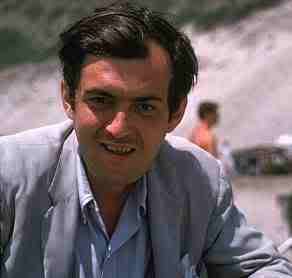
The what must always precede the how. No matter how
carefully you have pre-planned a scene, when you actually
come to the time of shooting, and you have the actors on
the set, having learned their lines, dressed in the right clothes,
and you have the benefit of knowing what you have already
got on film, there is usually some adjustment that has to be
made to the scene in order to achieve the best result.
~ Stanley Kubrick (from an interview with Michel Ciment in the book Kubrick, 1982)
Filmography
Flying Padre (short, 1951)
Day of the Fight (short, 1951)
Fear and Desire (1953)
The Seafarers (short, 1953)
Killer's Kiss (1955) MGM (R1) / MGM (R2 UK) included in Stanley Kubrick Collection with The Killing and Paths of Glory
The Killing (1956) MGM (R1) / MGM (R2 UK) included in Stanley Kubrick Collection with Killer's Kiss and Paths of Glory
Paths of Glory (1957) MGM (R1) / MGM (R2 UK) included in Stanley Kubrick Collection with Killer's Kiss and The Killing
Spartacus (1960) Criterion (R1) / Universal (R1) / Universal (R2 UK) also included in Historical Epics: Classic Cuts Collection
Lolita (1962) Warner (R1) / Warner (R2 UK) also included in The Stanley Kubrick Collection
Dr. Strangelove or: How I Learned to Stop Worrying and Love the Bomb (1964) Columbia (R1) / Columbia (R2 UK) also included in The Stanley Kubrick Collection
2001: A Space Odyssey (1968) Warner (R1) / Warner (R2 UK) also included in The Stanley Kubrick Collection
A Clockwork Orange (1971) Warner (R1) / Warner (R2 UK) also included in The Stanley Kubrick Collection / Warner (R4 AU)
Barry Lyndon (1975) Warner (R1) / Warner (R2 UK) also included in The Stanley Kubrick Collection
The Shining (1980) Warner (R1) / Warner (R2 UK) also included in The Stanley Kubrick Collection / Warner (R4 AU)
Full Metal Jacket (1987) Warner (R1) / Warner (R2 UK) also included in The Stanley Kubrick Collection
Eyes Wide Shut (1999) Warner (R1) / Warner (R2 UK) also included in The Stanley Kubrick Collection / Warner (R4 AU)
Forum Discussions
2001: A Space Odyssey
Day of the Fight
Dr. Strangelove: 40th Anniversary Edition
Eyes Wide Shut
Freudian based articles on Dr. Strangelove
The Killing
The Kubrick aspect ratio debate
Paths of Glory
Pepsi and Kubrick: The Ultimate Evil
The Seafarers
The Shining
Spartacus
Stanley Kubrick
The Stanley Kubrick Archives
The Stanley Kubrick Collection
Web Resources
Kubrick's Cinema Odyssey by Michael Chion - Lee Hill (Senses of Cinema, 2002)
The Kubrick Corner
Three Interviews with Stanley Kubrick - Michel Ciment (excerpted from Kubrick)
Kubrick Multimedia Film Guide - Patrick J. Larkin
The Kubrick Site - Roderick Munday's massive Kubrick Archive
Lolita: From Nabokov's Novel to Kubrick's Film to Lyne's - Constantine Santas (Senses of Cinema, 2000)
The Old Ultra-Violence - Vincent LoBrutto with David E. Williams (American Cinematographer, 1999)
Quest for Perfection - Ron Magid (American Cinematographer, 1999)
Stanley Kubrick - Keith Uhlich (Senses of Cinema, 2002)
Stanley Kubrick: 1928-1999 - The New York Times Kubrick Page
Stanley Kubrick 1928-99 Resident Phantoms - (Sight and Sound, 1999)
Stanley Kubrick Collection Official Authorized Site - Warner Bros
Strangelove Outtake: Notes from the War Room - Terry Southern (Now Dig This: The Unspeakable Writings of Terry Southern)
A Sword in the Bed - Stephen Pizzello (American Cinematographer, 1999)
Temporal Reconfigurations in Kubrick's 2001 - Colette Balmain (Enculturation, 2000)
Total Eclipse of the Heart: Thinking through Technology - Niall Lucy (Senses of Cinema, 2000)
What They Say About Stanley Kubrick - Peter Bogdanovich (The New York Times Magazine, 1999)
Books
A Cinema of Loneliness - Robert Phillip Kolker (Oxford University Press, 1980)
Kubrick: The Definitive Edition - Michel Ciment (Faber & Faber, 2001)
Filmguide to 2001: A Space Odyssey - Carolyn Geduld (Indiana University Press, 1973)
Kubrick: Inside a Film Artist's Maze - Thomas Allen Nelson (Indiana University Press, 2000)
The Making of Kubrick's 2001 - Jerome Agel, editor (Signet, 1970)
The Making of 2001: A Space Odyssey - Stephanie Schwam, editor (Modern Library, 2000)
The Philosophy of Stanley Kubrick - Jerold J. Abrams, editor (University Press of Kentucky, 2007)
Stanley Kubrick: A Biography - Vincent LoBrutto (Da Capo, 1999)
Stanley Kubrick Kinematograph Nr. 20 (Deutsches Filmmuseum Frankfurt am Main, 2004)
Stanley Kubrick: Interviews - Gene D. Phillips, editor (University Press of Mississippi, 2001)
Stanley Kubrick: A Film Odyssey - Gene D. Phillips (Popular Library, 1975)
Stanley Kubrick: A Life in Pictures - Christiane Kubrick (Bulfinch, 2002)
The Stanley Kubrick Archives - Alison Castle, editor (Taschen, 2005)
The Wolf at the Door: Stanley Kubrick, History, and the Holocaust - Geoffrey Cocks (Peter Lang Publishing, 2004)
_______________________________________________________________________________________